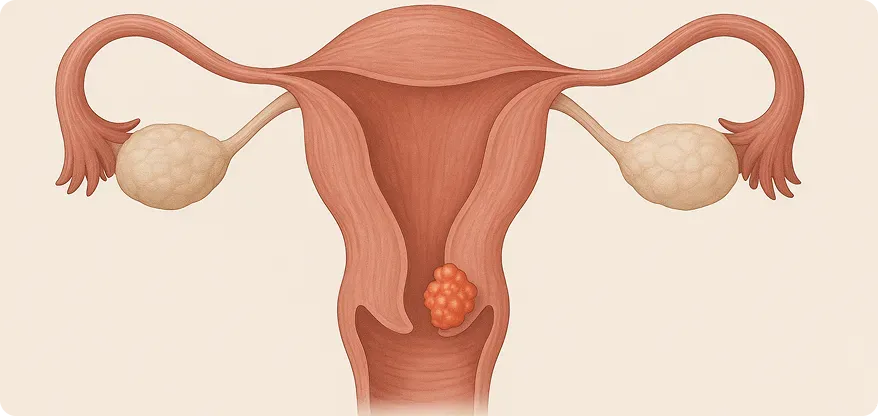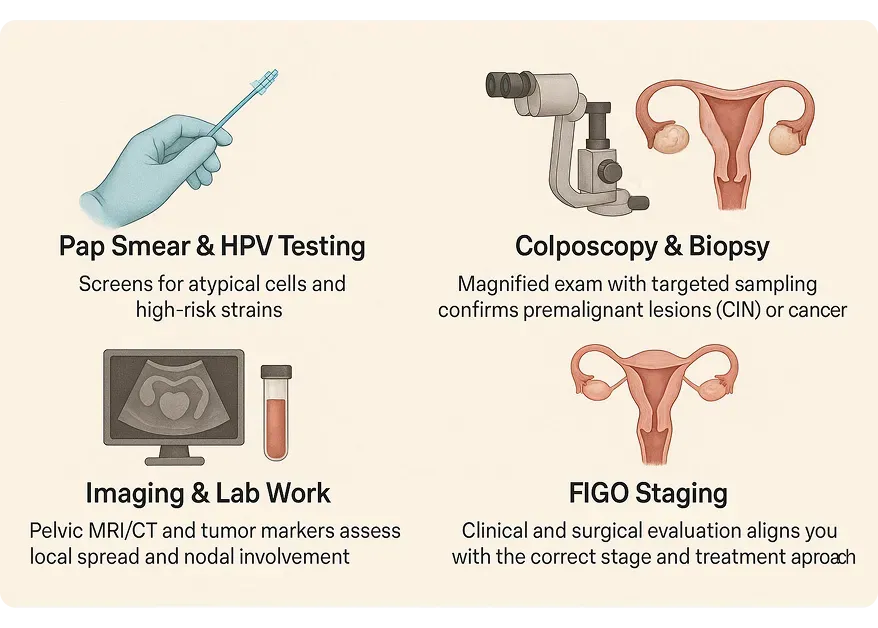DISEASES
Multidisciplinary Cervical Cancer Care in Valencia
Comprehensive, Multidisciplinary, Rapid Diagnosis & Minimally Invasive Treatment — Trusted by Women Worldwide

Discovering unexpected bleeding after intercourse or spotting between cycles can feel deeply unsettling. In moments like these, urgent questions arise:
- “How advanced is it?”
- “Will I still be able to have children?”
- “How soon can I begin treatment?”
At our center in Valencia, Dr. Minig and his multidisciplinary team offer same-day Pap and HPV testing, colposcopy with targeted biopsy, and FIGO-guided staging—all delivered with clarity and compassion.
Our focus is clear: we move quickly into individualized, evidence-based care, offering world-class surgical outcomes with a truly human approach.
Whether you’re based in Europe, North America, Latin America, or beyond, we streamline every step for international patients seeking fast, world-class treatment without unnecessary delays.
Dr. Lucas Minig — Expert Gynecologic Oncology & Fertility-Sparing multidisciplinary Care

What Is Cervical Cancer?
Cervical cancer arises when abnormal cells on the cervix proliferate. Because early changes are detectable via routine Pap smear and HPV testing, timely intervention can halt progression before invasive disease develops.
Patients worldwide trust our expertise to treat precancerous lesions and invasive cancer with fertility-sparing precision when it's needed and medically appropriated.
What Causes Cervical Cancer?
Understanding risk factors helps us personalize prevention and screening:
- High-Risk HPV (types 16 & 18 cause ~70% of cases)
- Multiple Partners & Early Sexual Activity (increases HPV exposure)
- Smoking (impairs cervical immunity)
- Immunosuppression (e.g., HIV, chronic steroids)
- Long-term Contraceptive Use (> 5 years slightly elevated risk)
- Age & Parity (peak incidence 35–55, especially with multiple births)
Recognize the Early Warning Signs
When something feels off, your body is trying to tell you something — but you do deserve clarity. The earlier we understand what’s happening, the more options you’ll have.
Bleeding After Intercourse (Post-Coital Bleeding)
It may be easy to brush off as irritation—but if it happens more than once, it’s worth looking into.
Spotting Between Periods (Intermenstrual Bleeding)
Irregular bleeding can be a sign of hormonal shifts, infection, or something more. Track it. Speak up.
Unusual Discharge
If your discharge suddenly becomes watery, blood-tinged, or develops a strong odor, it could be a sign of cervical inflammation or disease.
Pelvic Discomfort (Unrelated to Menstruation)
A subtle heaviness, ache, or pressure in the pelvis that lingers—especially if it’s new—should be explored.
Changes in Urination or Bowel Habits
More frequent urination, constipation, or pelvic pressure during these functions may indicate that something deeper is going on.
You know your body best. If something doesn’t feel right, it’s okay to ask for answers.

How We Diagnose—Fast & Precise
When something feels off, your body is trying to tell you something — but you do deserve clarity. The earlier we understand what’s happening, the more options you’ll have.
-
Pap Smear & HPV Testing
Screens for atypical cells and high-risk strains -
Colposcopy & Biopsy
Magnified exam with targeted sampling confirms premalignant lesions (CIN) or Cancer -
Imaging & Lab Work
Pelvic MRI/CT and tumor markers assess local spread and nodal involvement -
FIGO Staging
Clinical and surgical evaluation aligns you with the correct stage and treatment algorithm
Request Consultation or Second Opinion

Your personalized & multidisciplinary treatment pathway
We personalize every step — whether you are local or traveling from overseas.
Our team coordinates closely with international patients to minimize travel stays and ensure fast, streamlined care.
No two people — and no two diagnoses — are exactly the same. That’s why we take the time to understand your stage, your goals, and your vision for the future, including fertility and quality of life. You are not a case — you are a person. And your care plan will reflect that.
- Early-Stage (IA–IB1)
For early cervical cancer, we focus on preserving both your health and your reproductive potential whenever possible and if it’s needed.- Conization or LEEP
Removes the abnormal area of a part of the cervix while keeping the uterus intact. Often outpatient and fertility-preserving. - Radical Trachelectomy
A more extensive surgery that removes the entire cervix but leaves the uterus—an option for those hoping to carry a pregnancy in the future (with support like a cervical stitch during pregnancy). - Radical Hysterectomy & Sentinel Lymph Node Detection
A surgical approach that prioritizes recovery while ensuring thorough cancer removal.
- Conization or LEEP
- Locally Advanced (IB3–IIA2)
When the disease has progressed but remains within the pelvic region, we combine precision with compassion.- Radical Hysterectomy & Sentinel Lymph Node Detection
A surgical approach that prioritizes recovery while ensuring thorough cancer removal. - Concurrent Chemoradiation
A carefully timed combination of radiation and chemotherapy to shrink and eliminate cancer cells, guided by protocols that minimize side effects wherever possible.
- Radical Hysterectomy & Sentinel Lymph Node Detection
- Advanced or Recurrent (IIB–IV)
Even in complex cases, there are options — and always support.- Multi-Modal Therapy
A personalized combination of surgery, chemotherapy, radiation, and sometimes targeted therapies like bevacizumab, aimed at controlling disease and extending life. - Palliative & Supportive Care
Focused entirely on you—your comfort, your priorities, your peace. From pain management to emotional support, we’re here to walk with you every step of the way.
- Multi-Modal Therapy
This is your body, your future, your life. Our role is to bring clarity, compassion, and science together—so you feel empowered, not overwhelmed.
Recovery Timeline After Surgery: What to Expect
Many of our global patients return home quickly, supported by virtual check-ins and local coordination.
Days 1
Walking within hours post-surgery
Days 10–12
Home recovery with virtual follow-up; and direct access to Dr. Minig 24/7
Weeks 2–4
Normal activities resume according with level of pain; discomfort fades. Back to full routines, including exercise
Months 2–6
Monitor side effects; pelvic rehabilitation & physical therapy
Long term
Pap/HPV tests every 3–6 months for 2 years, then annually; imaging as needed
Why choose Dr. Minig & our team
Extensive specialized oncology training in the main medical centers in Italy and the United States
- Rapid, Coordinated Care: Tests and therapies start within days
- Minimally Invasive Expertise: Laparoscopic & robotic techniques for faster healing and recovery
- Fertility-Sparing Focus: Early-stage options designed to preserve motherhood when it’s needed or medically indicated
- Comprehensive Support: Oncology, fertility counseling, nutrition & psychosocial care—all under one roof
- Global Reach: Personalized logistical support for international patients
- Industry-Leading Research & Innovation
“Dr. Minig’s expertise let me restart my workouts just two months after surgery—without fear of a bulge returning.”
— Marta S., Valencia

International patient welcome
Whether you’re in Europe, North America, or beyond, our clinic offers:
Tele-Consultations in English, Spanish and Italian
Concierge Travel Assistance for visas, lodging, and local transportation
Flexible Scheduling to accommodate your time zone
Frequently asked questions
Will I retain fertility?
Selected early-stage treatments (conization, trachelectomy) preserve childbearing potential in patients under 40.
What are the risks of surgery?
Risks (bleeding, infection, urinary/bowel injury) are minimized by advanced laparoscopic protocols and prophylaxis.
How soon can I resume normal life?
Most women return to light activities in 4 weeks; full exercise and work by 2–3 months, depending on therapy intensity.
Ready to Take the Next Step?
Swift, minimally invasive care in Valencia can fast-track your treatment and peace of mind.
Request Your Urgent Consultation

Next Steps
More than a clinic — we are your international partner in healing. With virtual consults, fast-track scheduling, and full travel support, we make Valencia cervical cancer surgery seamless — wherever you live.
